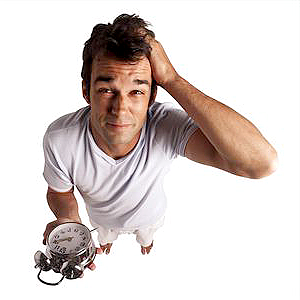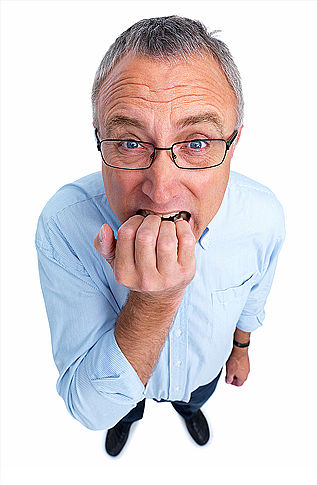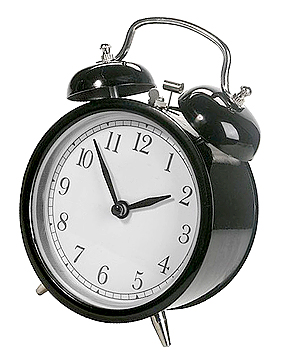Popular Articles
- 10 Natural Sleep Supplements
- GABA and Insomnia
- Moderex Supplement Facts
- Does Bad Sleep Damage Your Heart?
- 8 Foods That Help With Insomnia and Anxiety
- Sleeping Remedy by Natrol
- 7 Foods That Cause Insomnia
- Popular Sleep and Anxiety Drugs May Be Linked to Dementia
- Home Remedies for Sleeplessness
- Chamomile Tea for Insomnia
 The common mistake that leads to anxietyIn This Article
Every night, millions of Americans are worried about getting the right amount of sleep and they fear that their insomnia will affect their mental and physical performance during the day. The insomnia pandemic is now considered a public health issue and it is feeding an expanding market for sedative drugs. But are we getting too worried about our sleeplessness? The evidence suggests so and it seems that sleep anxiety is as much a problem as the insomnia that fuels it. Are your right to be anxious about your sleep deprivation? What can you do about it? Read on to find out.
The Need for SleepSleep represents a time for the body to power down and recover from the stress of the day. Even vital organs such as the brain and heart slow down their activities during sleep. Sleep also provides time for the muscles to relax and allows the body to repair itself. Sleep is especially important to the nervous system. For example, the body consolidates memories while we sleep. This is why sleep deprivation affects cognition, learning and memory recall. When we do not sleep enough, the circadian cycle of the body is thrown off. Therefore, neurotransmitters and hormones are released and metabolized in the wrong sequence. Such interference with the nervous system can lead to anxiety disorders and depression. Besides the nervous system, the cardiovascular system is also severely affected by sleep deprivation. Multiple studies have established that chronic sleep deprivation can increase the risk of angina, heart disease and stroke. Too often we postpone sleeping until when we believe we can afford to take prolonged rest. Sleeping in over the weekend may make up for some of the hours lost during the week but the body may never fully recover from the effects of not regularly sleeping for the right amount of hours. On the other hand, oversleeping is just as dangerous as sleep deprivation. Sleeping for too long every day also disrupts the circadian cycle. In the same way as sleeping a few hours, sleeping for too long affects the release of neurotransmitters and hormones in the body. It is no wonder then that we rarely feel refreshed if we sleep too long. The Dangers of Sleep DeprivationClearly, insomnia is now a public health problem. In one poll conducted by the National Sleep Foundation, it was reported that only 4 out of every 10 Americans get enough sleep every night.
Lack of sleep takes its toll on mental and physical health. While some of these effects are seen immediately, the more dangerous ones are experienced later and may even seem unrelated. For example, sleep deprivation can promote immediate weight gain while slowly reducing insulin sensitivity and increasing the risk of diabetes. Studies show that people who don’t get enough sleep are likely to crave carbohydrates and processed foods in the form of quick meals. This is because the brain has a constantly high need for glucose since it has no chance to power down and recover. The increased glucose need raises blood sugar levels and slowly pushes the sleep-deprived individual into a pre-diabetic state characterized by insulin resistance. The high intake of carbohydrates can also lead to immediate weight gain as the body stores excess glucose. However, weight gain can also be triggered by an imbalance in 2 hormones responsible for regulating appetite. Sleep deprivation raises the level of ghrelin (a hormone that tells the brain the body is hungry) and reduces the level of leptin (the hormone that tells the brain that the body is sated). This hormonal imbalance increases food cravings and promotes weight gain while also raising the risk of diabetes. Other consequences of hormonal imbalances triggered by sleep deprivation include hypertension, depression, accelerated aging, impairment of the immune system and increased risk of cancer. The Ideal Sleep DurationIf oversleeping is just as harmful to health as sleep deprivation, what then is the optimal amount of sleep we should get every night? The consensus among sleep experts is that the average adult needs 7 – 8 hours of sleep every night. However, the answer is not so simple. For example, children and teenagers need more sleep than adults because they are in their formative years and are experiencing rapid growth and huge hormonal changes. Besides age, the required amount of sleep that you need also depends on other factors. The National Sleep Foundation provides an accurate view of the two sides of the sleep equation.
When these 2 sides of the sleep equation are factored in, the sleep requirement for any healthy adult will be between 7 and 9 hours every night. To determine what your optimal sleep duration should be, you should learn to listen to your body. Dozing off during the day and in the middle of performing tasks is one indication that you are not getting sufficient sleep at night. In addition, if you don’t feel refreshed in the first few moments of waking up (and before your body catches up), then you are getting fewer hours of sleep than you really need. Anxiety and Sleep: The Chicken-Egg DebateEven as insomnia affects more people (especially urban dwellers), there is an increased awareness of the dangers of sleep deprivation. This creates a rather strange condition known as sleep anxiety.
They are also worried about long-term damage that insomnia will do to their health. Because this danger is real, they really do have grounds to be worried. In one study, researchers found that sleeping for less than 5 hours every night doubles the risk of cardiovascular disease, obesity, and diabetes. In another study presented at the 2012 SLEEP conference in Boston, researchers measured the anticipatory responses of 18 adults after a normal night’s sleep and then after sleep deprivation for 24 hours. The results of the study showed that sleep deprivation dramatically increases anxiety levels especially in people who are prone to anxiety disorders. However, scientists are not sure whether people with anxiety disorders are more prone to insomnia or whether sleep deprivation triggers sleep anxiety. Some experts argue that sleep anxiety should be treated like a bad habit. They believe that only when an insomniac stops worrying about going to sleep can he/she get sound sleep.
Studies on Sleep, Anxiety, and DepressionSleep Duration and Cardiovascular DiseaseIn a study published in the journal, Sleep, a group of researchers determined the effect of sleep duration on the risk of cardiovascular disease. They worked from the hypothesis that the ideal sleep duration was 7 hours.
They found that both short and long sleep duration increased the risk of cardiovascular disease. The results of the study showed that people who slept for less than 5 hours and those who slept more than 9 hours every night had significantly higher risks of angina, heart attack and stroke. However, a 2005 NIH study contended that sleeping for long did not directly increase the risk of cardiovascular disease but that factors associated with high mortality tended to promote sleeping for longer than normal hours. Therefore, while there is still a debate over whether sleeping for too long is as bad for health as short sleep, there is no doubt that sleep deprivation negatively impacts health. How Anxiety Affects Sleep StructureWhile it is well established that anxiety can reduce the number of hours of sleep, there are also indications that the effect of anxiety on sleep extends beyond duration. A 1997 study published in the Journal of Sleep Research & Sleep Medicine investigated the effect of anxiety on sleep structure. For this study, the researchers recruited 15 adults who were diagnosed with generalized anxiety and contrasted them with 15 normal adults. Polysomnogram measurements revealed the differences between the sleep structures of these 2 groups of participants. The results of the study showed that the high-anxiety group
The researchers, therefore, concluded that worrying can significantly alter sleep architecture in such a way as to reduce quality and duration of sleep. Anxiety and Sleep Disorder in ChildrenA 2005 study published in the journal, Infant and Child Development, investigated the link between anxiety, cognition and sleep disorders in children. By collecting data from 79 children aged 8 – 11 years, the researchers determined that anxiety was related to different forms of sleep problems including sleep anxiety, nightmares and resistance to turn in at bedtime. They also discovered that sleep problems can be predicted in school-aged children by anxiety problems such as fear of going to school and concerns about academic performance. Another 2005 study published in the Journal of Abnormal Child Psychology examined a different aspect of childhood sleep problems in relation to anxiety. In this study, the researchers determined whether chronic sleep problems in childhood are linked to the risks of depression and anxiety disorders in adulthood. Therefore, they collected childhood sleep and behavioral data from the parents of 943 participants. This data was correlated with measured depression and anxiety in adults whose childhood information was gathered. After correcting for bias, the researchers found out that persistent childhood sleep problems increase the risk of anxiety disorders in adulthood but not the risk of depression. This study highlights the importance of treating sleep problems in children in order to prevent anxiety disorders later in adulthood. Can “Giving up” Help?Sleep anxiety has been described as a paradoxical problem and a habit that feeds upon itself. Therefore, some experts advocate that insomniacs who worry about the effects of sleep on their health can sleep better simply by stopping to worry. But is that advice backed by solid scientific evidence? In a 1993 study published in the journal, Psychotherapy: Theory, Research & Practice, the researchers investigated the benefits of simply telling patients to give up their anxiety over lack of sleep. To conduct this study, the researchers randomly assigned any of 3 sets of instructions to 33 adults with sleep anxiety. These 3 instructions were
The researchers found that all the 3 sleight-of-hand instructions and treatment improved sleep efficiency. However, only the participants in the 2 groups told to “give up trying” got relief from sleep anxiety. This study demonstrates that sleep anxiety is really a habit. It also shows that this anxiety (and possibly the resulting insomnia) can be reduced simply by not feeding it with worry and anxious efforts to get some sleep. Sourceshttp://articles.mercola.com/sites/articles/archive/2010/08/23/seven-hours--the-magic-number-for-sleep.aspx http://www.adaa.org/understanding-anxiety/related-illnesses/sleep-disorders http://www.calmclinic.com/anxiety/symptoms/sleep-problems
[+] Show All
|
||||
| Next Article: What Causes Sleep Problems |





 The reach of this
The reach of this  People who suffer from sleep anxiety are constantly worrying about the toll that their lack of sleep will take on their daily activities the next day.
People who suffer from sleep anxiety are constantly worrying about the toll that their lack of sleep will take on their daily activities the next day. By taking data from the 2005 National Health Interview Survey, the researchers were able to gather the sleeping habits of over 30,000 adults and also the prevalence of cardiovascular disease among the participants.
By taking data from the 2005 National Health Interview Survey, the researchers were able to gather the sleeping habits of over 30,000 adults and also the prevalence of cardiovascular disease among the participants.